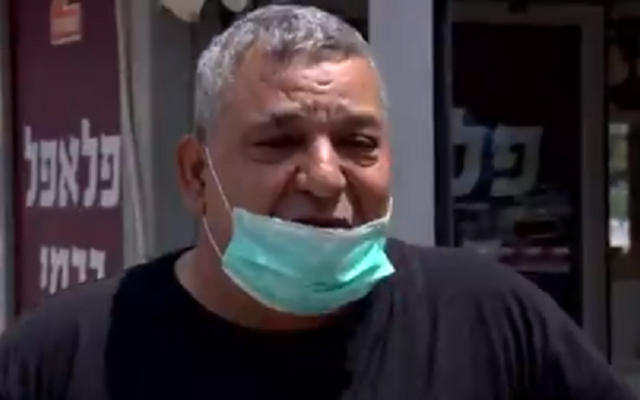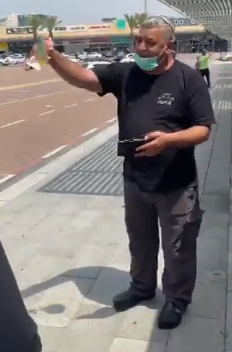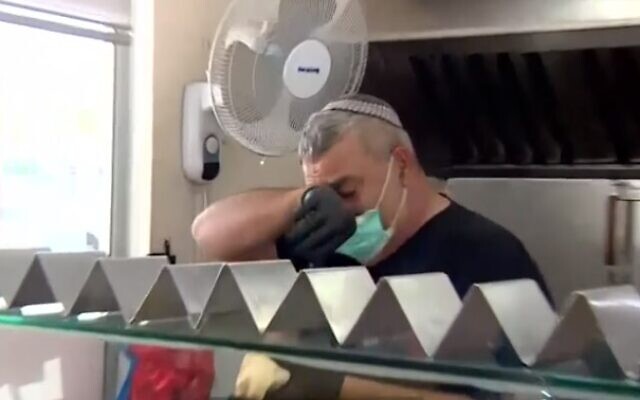Yuval Carmi, banned from operating his shop amid pandemic and deep in debt, pleads for Netanyahu’s help: ‘I’m embarrassed from my children. I have nothing to give them to eat’

In an interview that led the primetime evening news, and moved the TV crew filming it to tears, a sobbing falafel store owner told Israeli television on Sunday that he has been devastated financially by the coronavirus crisis and can no longer feed his children.
“Look at my wallet, it’s empty,” Yuval Carmi of Ashdod told Channel 13, pulling out his wallet. “I don’t have a shekel in my pocket.”
“I’m embarrassed, from my children, to tell them I have nothing I can buy for you. I have nothing to give them. I have nothing to give them to eat.
“I don’t know what to do. I don’t know what to do. I don’t know what to do,” he said, crying and then apologizing for his tears.
The TV report described Carmi as the face of the economic devastation being wreaked in Israel by COVID-19, a man whose anguished pleas “have turned him into the symbol of the economic collapse,” Channel 13 reporter Noga Nir Neeman said. “A man who paid his taxes for years and provided honorably for himself and his family, and who, with his business in ruins, doesn’t understand why the state isn’t helping him.”

The reporter said Carmi stood quietly when the TV station’s camera crew arrived, “and just asked to be allowed to tell his story.” As they started filming, Carmi reported that a customer had just arrived, but that police had prevented him from serving him, because falafel stands, like all restaurants, are not allowed to serve customers, but only to deliver food, “and I’m not set up to do deliveries.”
He said he reopened his small store on Sunday morning, believing that the newly eased COVID-19 restrictions meant he was allowed to do so, but that police had told him he could only do deliveries. “It’s falafel,” he wept. “Falafel has to be eaten hot and fresh.”
He said he pays NIS 12,000 (some $3,500) a month in rent, but now has no more money. When he tried to order from his suppliers after the just-ended Passover festival, he said, they refused to supply him. “I have a family, I have children at home, I don’t know what to do,” he said.
Carmi said he was not looking for handouts, but merely wanted to earn an “honorable living.”
“I didn’t receive any money from the state. My whole life, I’ve paid national insurance, income tax. Everything, everything on time. I made an honorable living.”
Asked why he had not asked for a government-arranged loan, he said “It’s impossible to get hold of them.” From watching TV, “you’d think we’ve been given millions,” he said. “Not a shekel. Nothing. Nothing. I want to set myself on fire. I don’t know know what to do.

“I’m embarrassed to go home. Embarrassed to speak to my wife. What can I bring them? My daughter gave birth two months ago. I couldn’t even buy a present for the baby. What’s left for me in this country? What kind of a country is this?
“I’m sorry for crying,” he then told the reporter. “It’s not nice. It’s not nice for me to be seen crying like this …I love this country. I’m 56 years old and I still do [IDF] reserve duty.”
He said he had never had a check bounce, but now has debts of NIS 65,000 (some $18,500), due to having been required to close the store amid the pandemic.
Carmi asked the TV crew to come into the store and eat some falafel. “By this stage, our whole crew was in tears,” reporter Nir Neeman said, “for Yuval and thousands like him, wondering why the state wasn’t helping them in their toughest hour.”
She said people from Israel and overseas had been phoning the TV station offering donations since a preliminary report on Carmi went out earlier in the day, but that he did not want to take the money.
When a second crew interviewed Carmi again Sunday evening, he said: “I thank the people of Israel but I don’t want donations. I just want to make an honorable living.”
The most moving call he has had, he said, was from someone who saw him giving a group of soldiers at his stand free meals two months ago. “This person asked to pay for the meals. I told him, no. ‘It’s my mitzvah (good deed) to give free.’”
Carmi urged the prime minister and the government to “take care of the small businesses.”
Prime Minister Benjamin Netanyahu has highlighted loans and grants available for suffering businesses, but there has been a flood of criticism that the ostensible financial support is almost impossible to obtain.
On Sunday, in the latest of several such protests, hundreds of self-employed Israelis demonstrated outside the Knesset and in several locations throughout the country, decrying the lack of support from the government in their hour of need.
Some protesters focused their outrage on Netanyahu, with one distraught interviewee saying on Channel 12 news: “We voted for you. You were chosen as one who knows how to manage wars. In the coronavirus war you’ve failed! …You need to get up and get out!”
Yaron Zelekha, the former accountant general at the Finance Ministry, last week castigated the Treasury for failing to support battered small businesses. Noting that the government had authorized a one-time NIS 10,000 payment (some $2,850) last month to ailing firms, he told Army Radio that this should be a monthly payment through to at least July or August.
And Netanyahu’s economic adviser, Prof Avi Simhon, was berated on television last week for overseeing policies that are dooming small businesses.

Clothing company Fox Group’s CEO Harel Wiesel, who was sitting next to Simhon in the Channel 12 TV studio, said a fund set up by the government to help small businesses survive the crisis was not working properly, and was failing to disburse significant assistance.
“The problem with you is that you’re at the end of the line because you’re very, very rich, very, very successful,” Simhon quipped at him.
“What are you waiting for, for everyone to go hungry and die?” Wiesel shouted, offering to set up a fund of his own instead.
Unemployment in Israel has risen to 26.25 percent, or 1,093,465 people, Channel 12 reported Sunday.
Before the coronavirus outbreak, unemployment in Israel was at a record low of under 4%.
As reported by The Times of Israel
